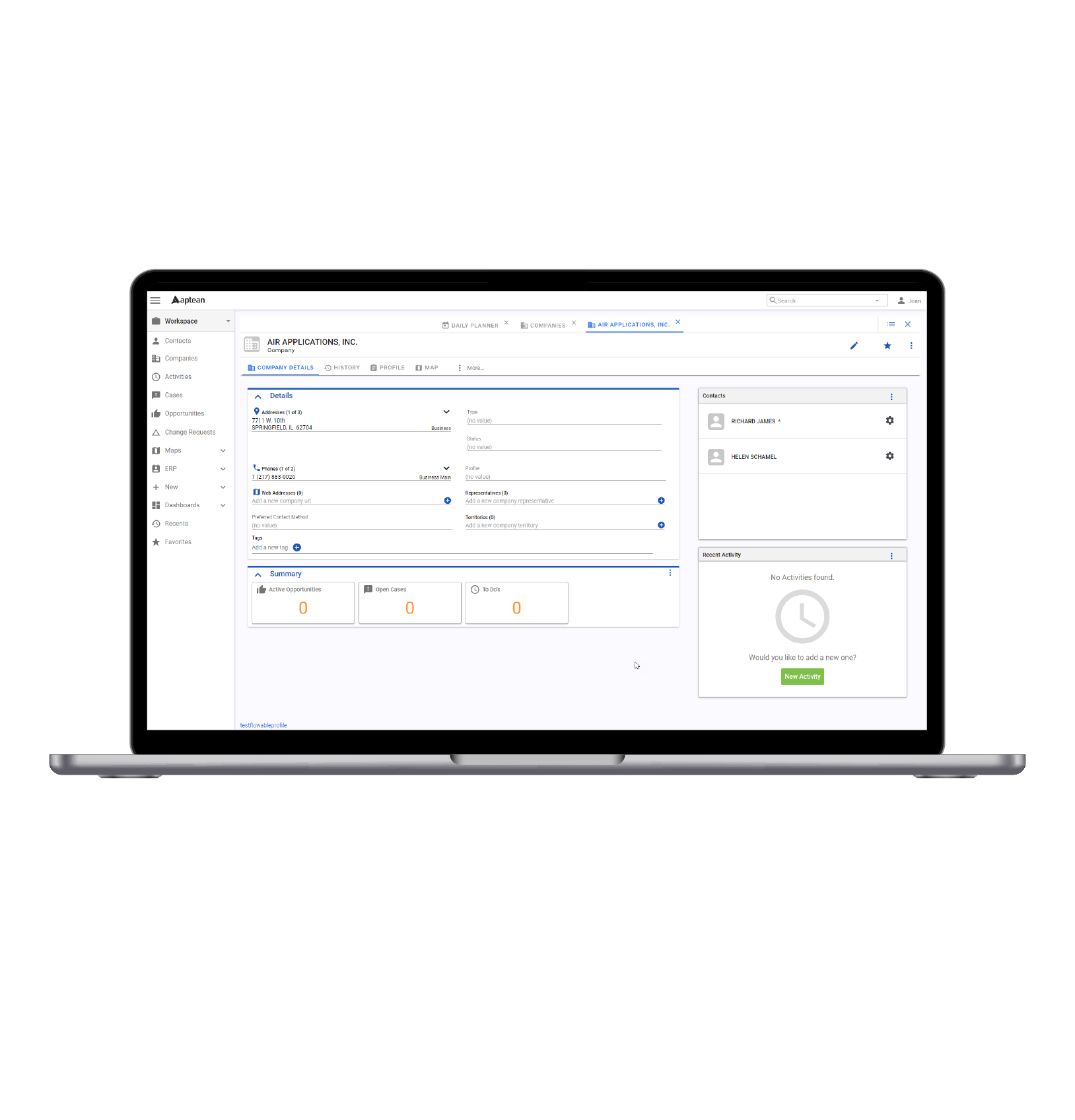Destacado en este post
Need-to-Know Info: Breaking Down the Types of ERP by Industry and Technology
Need-to-Know Info: Breaking Down the Types of ERP by Industry and Technology
Sept 7, 2022
 John McCurdy | Senior Content Writer, Marketing
John McCurdy | Senior Content Writer, Marketing
Here at Aptean, we champion enterprise resource planning (ERP) solutions as the gold standard for modern companies that want to manage their operations in an organized and holistic fashion. Another way to think about it—ERP systems form the bedrock that supports today’s leading businesses as they engage in digital transformation to grow, strive and succeed in their target markets.
But let’s take a step back and define what exactly enterprise resource planning means. Most sources agree that it is the act of managing and integrating various business processes, often in real time and with the help of technology. The term is also used to specifically refer to ERP software, as those platforms—when built with purpose and expertise—help organizations truly own all aspects of the operation.
That’s in no small part thanks to the fact that these solutions serve as a “single source of truth” for all employees, regardless of their role or function. They centralize a company’s information in a unified database that everyone can access with ease, eliminating the data siloes that develop when disparate systems are used by different departments.
Beyond that key point, though, there is great variance from platform to platform, as some are tailored to specific industries, and the underlying structure and functionality is largely determined by the providers that develop them. Before you go off to explore the available options and try to evaluate their fit with your organization, it’s a good idea to understand the main breakdown of the different types of ERP on the market.
Categorizing ERP Systems by Industry
One of the greatest strengths of ERP software is its versatility, and for that reason it’s been adapted for use across many industries and even sub-verticals within those industries. While some features are shared across just about all types of ERP software, others are developed with functionalities that are designed to help businesses confront the challenges that are entirely unique to their space.
Food and Beverage ERPs
The world of food and beverage production and distribution is not only huge in terms of monetary value but also in the variance between the different product segments. These include, but are not limited to:
Beverages (alcoholic and non-alcoholic)
Regardless of the type of products they deal in, all food and beverage businesses need bidirectional traceability, quality assurance, inventory control and recipe management tools within their ERPs. Also critical are food safety functions, including features for segregating and labeling allergens and managing recalls.
Manufacturing ERPs
Much like food and beverage businesses, manufacturing operations come in many shapes and sizes, but the first way that they are typically delineated is by the nature of their manufacturing procedures. There are process manufacturers, which combine various materials and ingredients to create a new whole that is not separable into its constituent parts; and discrete manufacturers, which are built by assembling different pieces into a whole that can be broken down into its parts if necessary.
Process manufacturers are distinguished by the fact that they use very precise formulas, making formula management a critical function that the companies that produce them need from their ERP solution in order to ensure consistent quality.
Discrete manufacturers—also sometimes referred to as industrial manufacturers—include those that produce computers and electronics; electrical equipment; fabricated metals; and transportation equipment. Apparel and fashion businesses are also often classified as discrete manufacturers, and while some of their needs are distinct from those in the prior list, all organizations within this larger category need dedicated inventory management tools built into their ERPs to keep track of all of the parts and materials that they have in stock.
Distribution and Retail ERPs
Finally, there are distribution and retail businesses and the ERP systems dedicated to them. Here, supply chain visibility is an absolute necessity, as these are the organizations that are tasked with getting the goods from the companies that produce them to the purchasing public, whether that’s delivering directly to consumers’ doors or placing them on store shelves.
Other features that these companies need include functionalities for managing chargebacks, customer allowances, royalties and commissions. There’s also a need for solid warehouse management capabilities, considering large stocks of various lines must be tracked and periodically replenished, as well as electronic data interchange (EDI) integrations to speed up and standardize transfers and transactions.
Categorizing ERPs by Technology
When it comes to the technologies of ERP systems, the first way to break it down is to categorize solutions based on their hosting model—either on-premise or in the cloud. On-premise systems allow the client business to have their own hardware in their facilities, but that can bring with it additional financial and IT burdens that most companies would rather avoid.
That’s why cloud ERPs have become so popular of late and are Aptean’s recommended deployment method whenever available. These implementations, operating on a Software as a Service (SaaS) model, afford users more flexibility, reliability, accessibility and data security thanks to redundant offsite servers and updates performed automatically by the provider’s dedicated IT teams.
A particular strength of Aptean Food & Beverage ERP is that its unique, industry-specific technology is built on the Microsoft Dynamics 365 Business Central platform, which gives it a user-friendly interface and compatibility with other popular Microsoft applications, including their Office suite.
Discover the Advantages of Aptean ERPs
Now that you know a bit more about the different kinds of ERP systems on the market, you’re just about ready to dive into this exciting space and determine which solution will work best for your company. Before you go, though, we’d like to point out that you may not even need to leave this domain to find what you’re looking for—there are several reasons to consider Aptean as your ERP provider of choice.
First, there’s our in-depth knowledge of ERP technology and its implementation best practices. We strive to act as a guide and partner during the deployment process, helping you craft a plan for success and providing advice all the way through to roll-out and beyond. We’re in for the long haul with each and every one of our clients because we truly want to see you succeed and reap a full return on investment (ROI).
Also consider our expertise in our target markets and how carefully we’ve crafted our industry-specific ERPs for the challenges that the businesses operating in them face. We “speak your language” and understand what your daily operations look like thanks to decades of collective experience, and we’ll never sell you a “one size fits all” software package when you really need a specialized, tailored solution.
Finally, there’s our entire ecosystem of complementary systems that will help you master other critical practices. For example, our overall equipment effectiveness (OEE) solutions improve efficiency and help you get the most out of your machinery and people. Meanwhile, our enterprise asset management (EAM) systems facilitate proper care of your manufacturing hardware, reduce unplanned downtime and minimize cost of ownership.
There’s still more to love, with our PLM platforms streamlining your new product development efforts and accelerating time to market; Aptean Routing & Scheduling simplifying the complex matter of distribution and delivery planning while also reducing costs; Aptean Business Intelligence providing actionable insights and robust KPI tracking for better decision-making; and Aptean EDI to streamline and automate data transfers.
So, excited to talk more about Aptean’s ERPs and how they can produce better results for your business? Contact us today, or request a personalized demo.
You can also take our digital transformation quiz or read more on our operations health assessment specifically for food and beverage businesses.
¿Todo listo para transformar tu negocio?
Tenemos las soluciones ERP especializadas que necesitas para superar los desafíos de tu sector.



